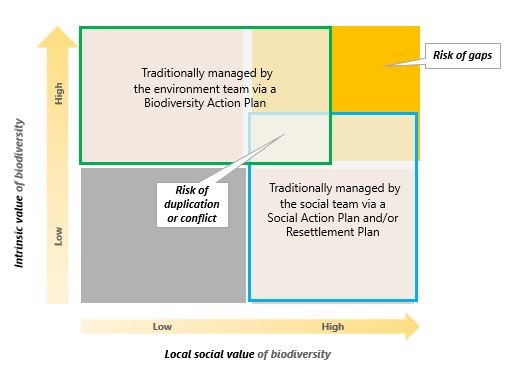Ecosystem services are the many and varied benefits to humans provided by the natural environment and healthy ecosystems. Such ecosystems include, for example, agroecosystems, forest ecosystem, grassland ecosystems, and aquatic ecosystems. These ecosystems, functioning in healthy relationships, offer such things as natural pollination of crops, clean air, extreme weather mitigation, and human mental and physical well-being. Collectively, these benefits are becoming known as ecosystem services, and are often integral to the provision of food, the provisioning of clean drinking water, the decomposition of wastes, and the resilience and productivity of food ecosystems.
By 2010, there had evolved various working definitions and descriptions of ecosystem services in the literature. To prevent double-counting in ecosystem services audits, for instance, The Economics of Ecosystems and Biodiversity (TEEB) replaced “Supporting Services” in the MA with “Habitat Services” and “ecosystem functions”, defined as “a subset of the interactions between ecosystem structure and processes that underpin the capacity of an ecosystem to provide goods and services”.
While scientists and environmentalists have discussed ecosystem services implicitly for decades, the Millennium Ecosystem Assessment (MA) in the early 2000s popularized this concept. There, ecosystem services are grouped into four broad categories: provisioning, such as the production of food and water; regulating, such as the control of climate and disease; supporting, such as nutrient cycles and oxygen production; and cultural, such as spiritual and recreational benefits. To help inform decision-makers, many ecosystem services are being evaluated to draw equivalent comparisons to human-engineered infrastructure and services.
Estuarine and coastal ecosystems are both marine ecosystems. Together, these ecosystems perform the four categories of ecosystem services in a variety of ways: “Regulating services” include climate regulation as well as waste treatment and disease regulation and buffer zones. The “provisioning services” include forest products such as timbers, marine products fresh water, raw materials, and biochemical and genetic resources. “Cultural services” of coastal ecosystems include inspirational aspects, recreation and tourism, science and education. “Supporting services” of coastal ecosystems include nutrient cycling, biologically mediated habitats, and primary production.
Ecosystem services are ‘the benefits that people, including businesses, derive from ecosystems’. This is the definition used by International Finance Corporation’s (IFC) Performance Standard 6 (PS6) in “Biodiversity Conservation and Sustainable Management of Living Natural Resources”. IFC organises ecosystem services into four types: provisioning; regulating; cultural; and supporting services. The most frequently discussed ecosystem services are those provisioning services also commonly referred to as ‘natural resources’, e.g. water, food, fibres and fuel.
Four Types of Ecosystem Services
The Millennium Ecosystem Assessment (MA), a major UN-sponsored effort to analyze the impact of human actions on ecosystems and human well-being, identified four major categories of ecosystem services: provisioning, regulating, cultural and supporting services.
Provisioning Services
When people are asked to identify a service provided by nature, most think of food. Fruits, vegetables, trees, fish, and livestock are available to us as direct products of ecosystems. A provisioning service is any type of benefit to people that can be extracted from nature. Along with food, other types of provisioning services include drinking water, timber, wood fuel, natural gas, oils, plants that can be made into clothes and other materials, and medicinal benefits.
Regulating Services
Ecosystems provide many of the basic services that make life possible for people. Plants clean air and filter water, bacteria decompose wastes, bees pollinate flowers, and tree roots hold soil in place to prevent erosion. All these processes work together to make ecosystems clean, sustainable, functional, and resilient to change. A regulating service is the benefit provided by ecosystem processes that moderate natural phenomena. Regulating services include pollination, decomposition, water purification, erosion and flood control, and carbon storage and climate regulation.
Cultural Services
As we interact and alter nature, the natural world has in turn altered us. It has guided our cultural, intellectual, and social development by being a constant force present in our lives. The importance of ecosystems to the human mind can be traced back to the beginning of mankind with ancient civilizations drawing pictures of animals, plants, and weather patterns on cave walls. A cultural service is a non-material benefit that contributes to the development and cultural advancement of people, including how ecosystems play a role in local, national, and global cultures; the building of knowledge and the spreading of ideas; creativity born from interactions with nature (music, art, architecture); and recreation.
Supporting Services
The natural world provides so many services, sometimes we overlook the most fundamental. Ecosystems themselves couldn’t be sustained without the consistency of underlying natural processes, such as photosynthesis, nutrient cycling, the creation of soils, and the water cycle. These processes allow the Earth to sustain basic life forms, let alone whole ecosystems and people. Without supporting services, provisional, regulating, and cultural services wouldn’t exist.
ES and impact assessments
Assessing and compensating for impacts on ecosystem services requires both social and environmental expertise and stakeholder consultation. Such a trans-disciplinary approach is rare in impact assessments, which tend to partition ‘social’ and ‘environmental’ impact assessments. This can mean duplication of efforts, or worse still, missing highly valued ecosystem services. It can result in negative impact on stakeholders, meaning both Affected Communities (meaning the group of stakeholders using an ecosystem service that is affected by the project and reliant on that ecosystem service for their wellbeing), and the industry project itself, which relies on ecosystem services like freshwater to function effectively.

